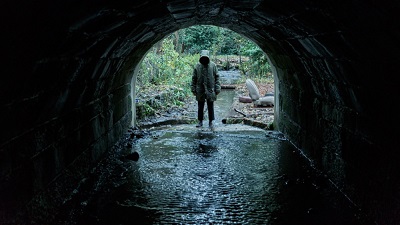
By Alex Brannan.
To break it down into the simplest of taxonomies, there are two types of horror anthology film: those which present discrete short films preoccupied around a central theme, and those which situate their shorts within a frame narrative. Both types have had a long cinematic history – the frame narrative anthology dating back as early as 1924 with Leo Birinsky and Paul Leni’s Waxworks. And the 21st century has seen an uptick in films from both categories. Numerous director showcases from the past decade alone have resulted in some good (e.g. V/H/S, 2012 and Southbound, 2016), some uneven (e.g. XX, 2017 and Holidays, 2016), and some downright messy (e.g. The ABCs of Death, 2012 and V/H/S: Viral, 2014) anthology films. What this new stock of films shows us is that an anthological horror film’s effectiveness is often dependent on the sum of its parts.
With Jeremy Dyson and Andy Nyman’s Ghost Stories, however, the equation is slightly different. It adopts the frame narrative formula, placing the audience in the shoes of a skeptic as he investigates three separate tales of unexplained supernatural phenomena. Like with any anthology horror film, Ghost Stories puts most of its narrative weight on its individual stories. It is not entirely reliant on the strength of these parts, though, as the narrative that creates the framing device is a compelling one on its own.
The skeptic in this frame story is professional hoax debunker Phillip Goodman (Nyman). Goodman hosts a television show in which he outs psychics as frauds, an occupation that leads him to the unsolved cases of one of the best debunkers in the game. It is easy to foresee that Goodman’s firm skepticism will be tested when he witnesses the aftermaths of the three cases, but the situation he finds himself in is more complicated than a binary view of belief. These cases contain your standard supernatural occurrences: lost loved ones, demons, poltergeists. You know, those campfire story apparitions that lurk just out of sight. But the real truth is more often hiding in plain sight, enough so here that the film plays equally thrilling on a second viewing.
On a first viewing, there are plenty of frights to keep your attention. They are traditional scares, though staged with a reverence and care that sets it apart from the cheap scare tactics of other horror pictures. The blocking of certain shots – such as an instance where a series of overhead lights shut off, one by one, over a character’s shoulder – makes the more conventional jump scares in the film feel somewhat silly, but even this adds to the film’s charm. It isn’t looking to startle you out of your seat. It’s one that takes the Twilight Zone route, cheekily examining perceptions of reality in an uncertain world.
 The acting, too, puts it a cut above the rest. Each story in the frame narrative is carried by the performance of a different actor – Paul Whitehouse, Alex Lawther, and Martin Freeman. In each case, the actor is more or less alone on screen as the events of their character’s tale are reenacted. They are tasked with embodying various degrees of near-silent unease as they move about their respective settings. Lawther is a particular standout in this regard. In the hands of a lesser actor, his character’s peevish anxiety would tip the scale from campy to cartoonish. Instead, his eyes flare with an existential terror that comes off as genuine.
The acting, too, puts it a cut above the rest. Each story in the frame narrative is carried by the performance of a different actor – Paul Whitehouse, Alex Lawther, and Martin Freeman. In each case, the actor is more or less alone on screen as the events of their character’s tale are reenacted. They are tasked with embodying various degrees of near-silent unease as they move about their respective settings. Lawther is a particular standout in this regard. In the hands of a lesser actor, his character’s peevish anxiety would tip the scale from campy to cartoonish. Instead, his eyes flare with an existential terror that comes off as genuine.
Nyman also gives a strong performance. Given that he also serves as co-writer and co-director on the project, and that the film is based on a stage play he co-created, it isn’t a surprise that he understands what to bring to the character to make it click. However, his character presents the broadest range of emotion and the bulk of the dialogue, his functionality crucial to the film’s success. He brings a convincing faux charm to Goodman that the character puts on while he interviews people, and when this charm is stripped away later in the film it is revealing.
What makes Ghost Stories so effective is its balance. It has both campy and earnest generic components. Moments of horror blend fear with wicked humor. The film uses the anthology framework not as a conceit but as a means of telling a thorough narrative. It might not be the most overtly horrifying horror movie of the year, but it proves itself to be one of the more clever and intelligent ones.
Alex Brannan is a freelance writer and critic. He publishes criticism at Cinefiles Reviews and can be found on Letterboxd and Twitter @TheAlexBrannan.
Read also:
